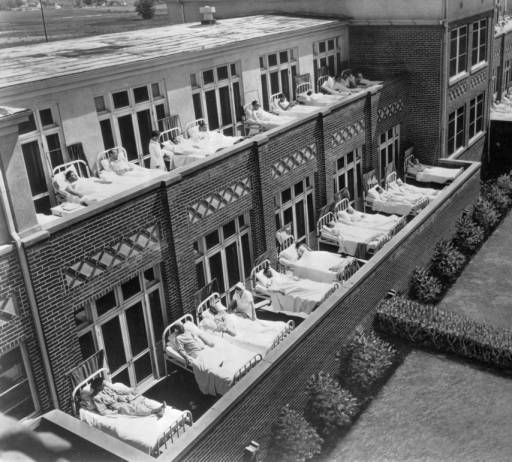Today we often think of early settlers coming to Colorado seeking wealth, but in fact, just as many — if not more — were seeking health. Respiratory diseases, especially tuberculosis, were widespread in America and Europe in the nineteenth century. At that time, medical professionals did not understand that tuberculosis was communicable. Instead, they believed that Colorado’s dry, fresh mountain air could cure the disease, and as a result, thousands emigrated to the state in search of the “climate cure.” According to an article in the Colorado Encyclopedia, “Although scientists discovered Mycobacterium tuberculosis – tuberculosis’s disease-causing agent – in the 1880s, doctors struggled to explain why and how it spread.” It wasn’t until the 1940s that antibiotics were developed for the treatment of the disease, and Colorado’s own Dr. Florence Sabin was among the country’s most influential tuberculosis researchers. (For data on tuberculosis in the 1940s and ’50s, see my previous Time Machine Tuesday post).
Colorado health reports from the 1870s, now available online from our library, offer a fascinating look at the extent of the medical professions’ knowledge about tuberculosis before it was understood or extensively researched. The report of the State Board of Health from 1876 — the year Colorado became a state — is particularly interesting because it contains a lengthy essay discussing forty-four cases of tuberculosis, or “pulmonary consumption” as it was then called. The case studies provide a wealth of historical information on the disease, its characteristics, and the people it affected. Also included in the 1876 report were essays on climate’s influence on asthma, another respiratory disease; the healing benefits of Colorado’s mineral hot springs; and an article entitled “Altitude: Its Influence on Health,” all highlighting Colorado’s perceived role as a health destination for sufferers of respiratory diseases and other ailments. These essays offer an insightful look at the state of medical knowledge and practice in the late nineteenth century.

- How to Spot the Differences Between Eagles and Hawks - August 16, 2021
- How Transportation Projects Help Tell the Story of Colorado’s Past - August 9, 2021
- Time Machine Tuesday: The Night the Castlewood Canyon Dam Gave Way - August 3, 2021
